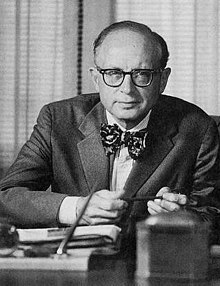Daniel J. Boorstin
Daniel Joseph Boorstin (born October 1, 1914 in Atlanta , Georgia , † February 28, 2004 in Washington, DC ) was an American historian and writer. He was director of the Library of Congress from 1975 to 1987 and one of the most influential intellectuals in America.
Life
Boorstin graduated from Harvard with top grades, then studied at Balliol College , Oxford on a Rhodes Scholarship and received his PhD from Yale University . He then served as a law professor at the University of Chicago and a lawyer for 25 years . At times he served as director of the National Museum of American History at the Smithsonian Institution in Washington. In 1969 he was elected to the American Academy of Arts and Sciences . Since 1981 he was an elected member of the American Philosophical Society .
When President Gerald Ford named Boorstin a candidate for the Librarianship of the Library of Congress in 1974, it was supported by the Authors League of America , but not by the American Library Association , since Boorstin "was not a library administrator." The Senate confirmed the nomination without debate.
While serving as the Librarian of Congress from 1975 to 1987, Boorstin founded the Center for the Book to promote reading and literacy . In addition, he was the driving force behind a ten-year project to completely renovate the Thomas Jefferson Wing of the Library of Congress to restore the main building to its original 1897 state. He became Librarian Emeritus of Congress on August 4, 1987.
Boorstin was politically more conservative, having briefly been a member of the Communist Party in his youth in the 1930s (before the McCarthy committees he regretted this in 1953 and was willing to "cooperate").
In 1969 Boorstin was elected to the American Academy of Arts and Sciences .
Works
Boorstin wrote more than 20 books, including a trilogy on American Intellectual History, the American Experience , which, like many of his books, became a bestseller. In 1974 he received the Pulitzer Prize for The Americans: The Democratic Experience , the final book of the first trilogy, which began with "The Colonial Experience" (1959) and "The National Experience" (1966, awarded the Francis Parkman Prize ) for history . Boorstin also wrote The Discoverers (1983) and The Creators (1992) and The Seekers (1998), three books that attempt to provide an overview of the cultural history of mankind. Boorstin's most influential book to date, however, was The Image. A Guide to Pseudo-Events in America from 1961, in which he introduced the term pseudo-event - for an event that takes place solely for the purpose of getting the media to cover it (e.g. a press conference). Since then, pseudo-events have been a key term for understanding media staging. A celebrity ( celebrity ) defines Boorstin in the book the way a human pseudo-event ( "The celebrity is a person who is known for his well-know ness."). The immediate source of his book was his anger over the television debates of Richard Nixon and John F. Kennedy .
Web links
- Literature by and about Daniel J. Boorstin in the catalog of the German National Library
- Biography at the Library of Congress
- Daniel Boorstin Collection
- Obituary in the Guardian
Individual evidence
- ↑ Member History: Daniel J. Boorstin. American Philosophical Society, accessed May 13, 2018 .
- ^ American Academy of Arts and Sciences. Book of Members ( PDF ). Retrieved April 15, 2016
| personal data | |
|---|---|
| SURNAME | Boorstin, Daniel J. |
| ALTERNATIVE NAMES | Boorstin, Daniel Joseph (full name) |
| BRIEF DESCRIPTION | American historian, head of the Library of Congress |
| DATE OF BIRTH | October 1, 1914 |
| PLACE OF BIRTH | Atlanta , Georgia |
| DATE OF DEATH | February 28, 2004 |
| Place of death | Washington, DC |
